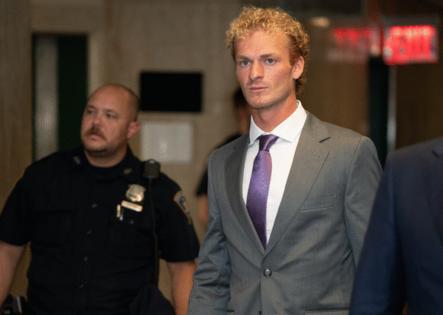'Vanishingly low' chance Jordan Neely died from anything but Daniel Penny's chokehold: NYC medical examiner
Published in News & Features
NEW YORK — A doctor from the New York City chief medical examiner’s office said the likelihood Jordan Neely died from drug use or poor health — as Daniel Penny’s lawyers have proposed — was “vanishingly low” as the prosecution rested their manslaughter case against the former Marine Monday.
Dr. Cynthia Harris, during her third day on the witness stand, faced a relentless line of questioning from Penny’s lawyers about her determination that Neely died of homicide caused by compression of the neck.
“The time course over which this is playing out is sufficient to kill anyone,” Harris testified in Manhattan Supreme Court about Penny’s caught-on-video chokehold of Neely on an uptown F train on May 1, 2023.
Asked on redirect by prosecutors what the chances were that Neely, who she said had a normal heart, dropped dead suddenly from a combination of having schizophrenia and using synthetic marijuana, Harris said, “Vanishingly low. It would be highly improbable.”
The doctor invoked a saying at the ME’s office, saying it was “so improbable that it stands shoulder-to-shoulder with impossibility.”
Harris said she would need to ignore the video showing Penny choking Neely until Neely fell unconscious and began displaying signs of “terminal brain injury,” damage to the inner structures of Neely’s neck, a “globally purple hue to his face,” congested veins, blood spots in his eyes typically caused by strangulation, and other symptoms to reach any other conclusion.
The defense sought to challenge Harris’ findings by questioning if Neely’s sickle cell trait ended his life, but Harris said that cause would take hours to days and there was no evidence of it. When pressed about the possibility he died from using synthetic cannabinoids, Harris said the drug Neely had consumed had led to only seven overdose deaths out of 10,000 studied by the medical examiner’s office in four years, and those people, unlike Neely, had abnormal hearts.
The defense also attempted to introduce into the jury’s minds that Harris had faced pressure from authorities to rule that Neely died by homicide because she didn’t determine the cause of death until the day after performing the autopsy.
Harris said she waited until having answers to questions like how long the chokehold lasted and Neely’s degree of responsiveness afterward. Once she and her colleagues watched footage of Penny choking Neely for several minutes until he passed out and ordered more testing, they determined “unanimously” that he died as a result of the chokehold.
Asked by prosecutor Dafna Yoran if anyone had pressured her, the doctor firmly said, “No.”
Penny, 26, of West Islip, L.I., has pleaded not guilty to second-degree manslaughter and criminally negligent homicide.
The incident occurred on a Monday afternoon as Penny was riding the F train from Brooklyn to the gym, and Neely got on at the Second Ave. subway stop and began screaming, at which point Penny took him down, witnesses have said.
Prosecutors say Penny’s actions — while initially appropriate, as he sought to protect passengers — became criminal when the train reached the next stop, Broadway-Lafayette St. There, they say, he “recklessly” choked Neely for nearly six minutes after passengers had fled to safety.
Penny’s lawyers, in addition to contesting Neely’s cause of death, have countered he was justified in subduing a man who appeared unstable and was terrifying subway riders.
Neely, 30, who battled untreated mental illness and poverty in the years before his death, has not been accused of touching anyone.
After the prosecution rested, Penny’s lawyers called as character witnesses his sister, Jacklyn Penny, and friend, Alexandra Fay, who each testified for around 10 minutes.
Penny’s sister, one year his senior, said they had two younger sisters and came from a tight-knit family and town. She said they were close to their grandparents, who played an important role in their lives when their parents split in high school.
Describing Penny as always being “very sweet to my friends,” Jacklyn Penny said he got good grades and played bass with the school orchestra and lacrosse.
She said, “being that (Penny) was always (a) very calm, soft-spirited person,” she worried when he wanted to join the Marines, but that “he was always patriotic” and men in their family had served.
Asked by Penny’s lawyer, Thomas Kenniff, at least a half dozen times whether his client had a reputation for being “calm and peaceful,” “empathetic” and “honest,” Penny’s sister and Fay said yes.
During a quick cross-examination, prosecutors asked Fay if it was true she’d donated to Penny’s legal defense fund, and she said she had. Justice Maxwell Wiley sustained an objection when they asked if she knew it had raised $3 million.
In the weeks after Penny’s arrest, he became a right-wing cause célèbre, with Trump-friendly Kid Rock, GOP presidential candidate Vivek Ramaswamy, and conservative podcaster Tim Pool contributing to the millions raised for his lawyers.
_____
©2024 New York Daily News. Visit at nydailynews.com. Distributed by Tribune Content Agency, LLC.







Comments